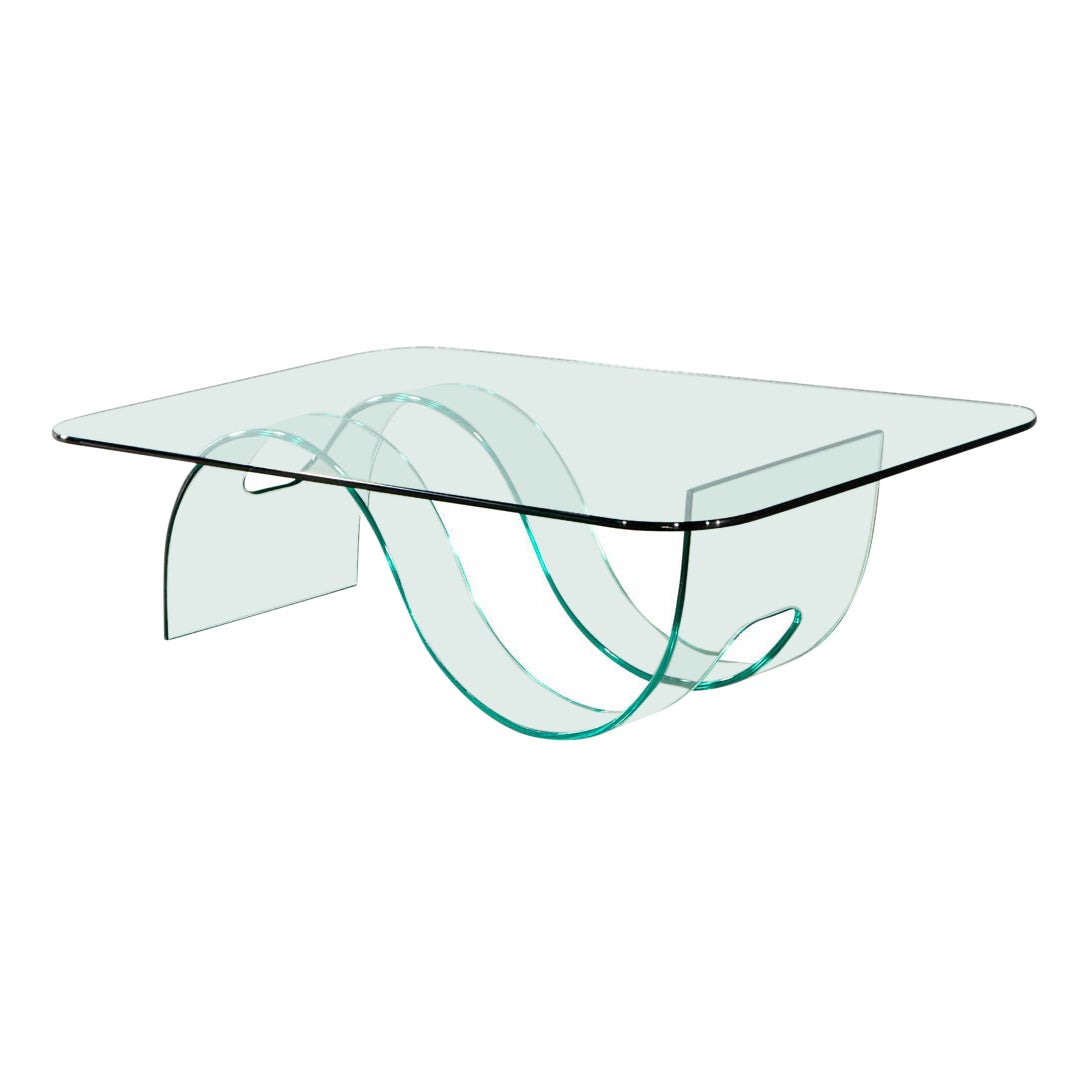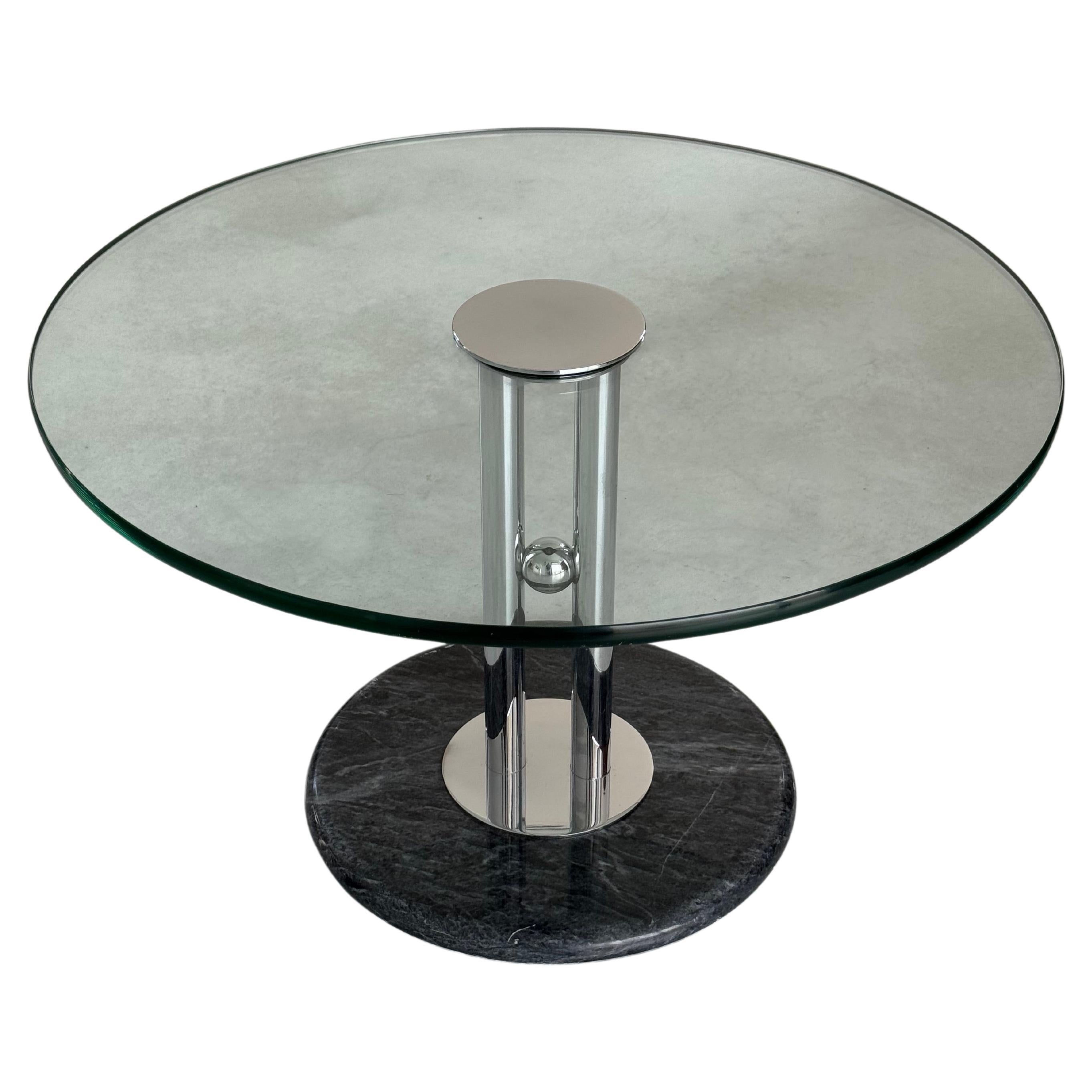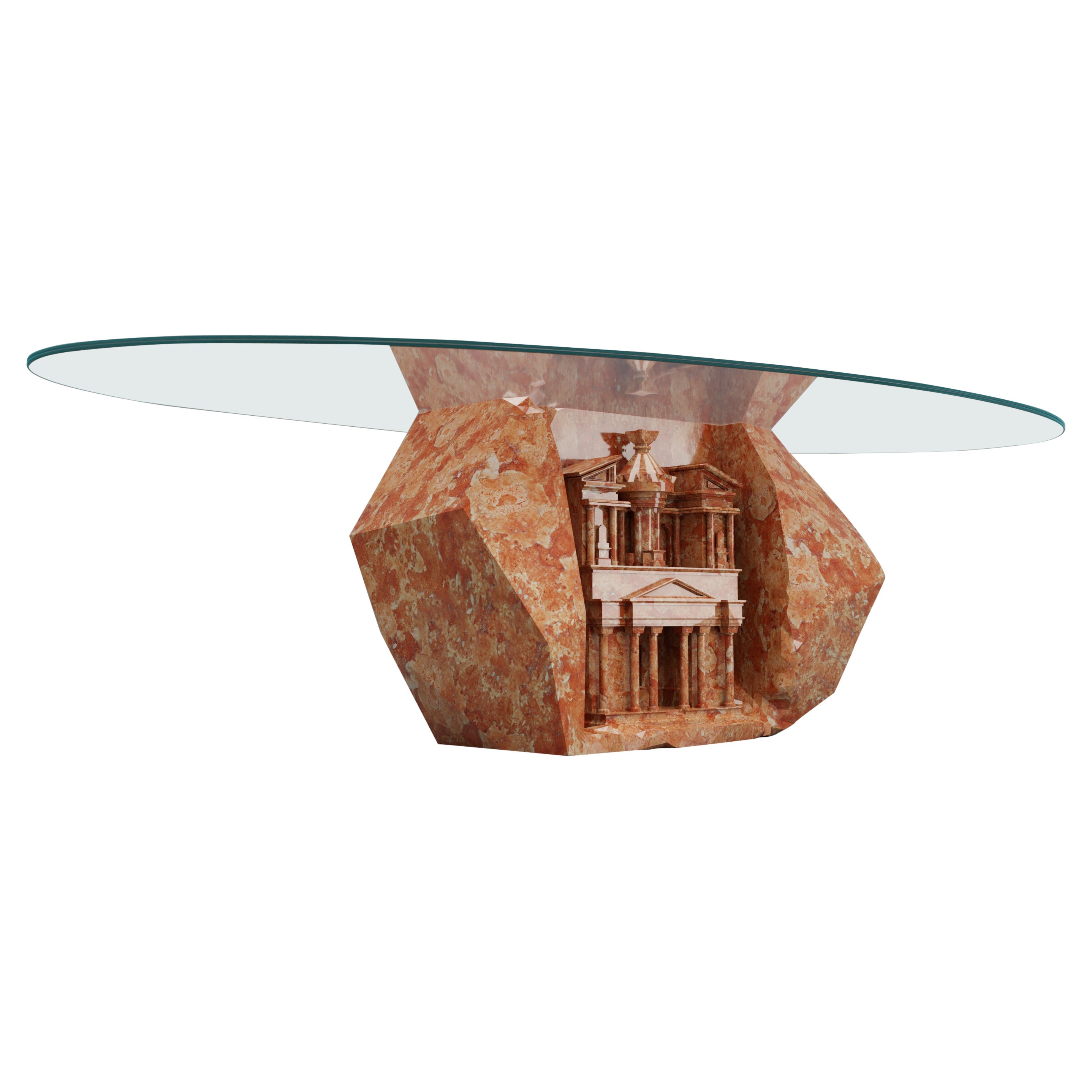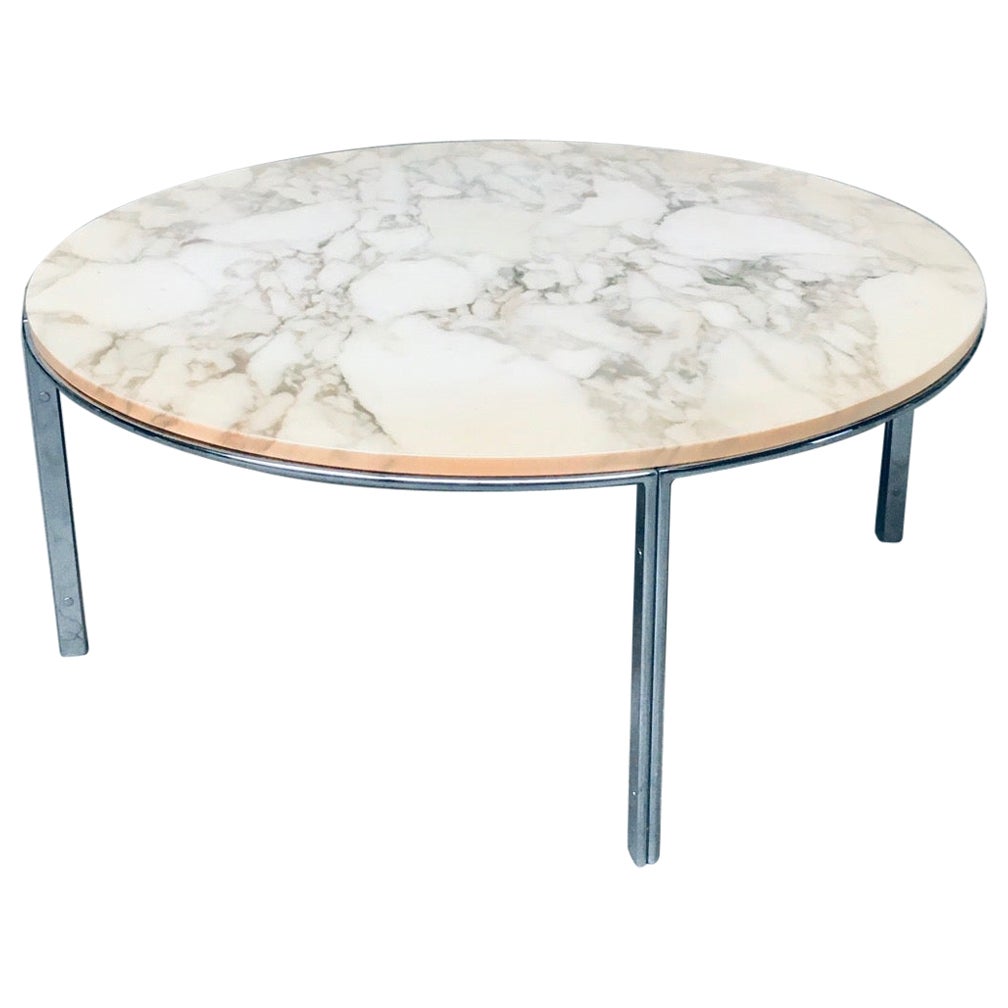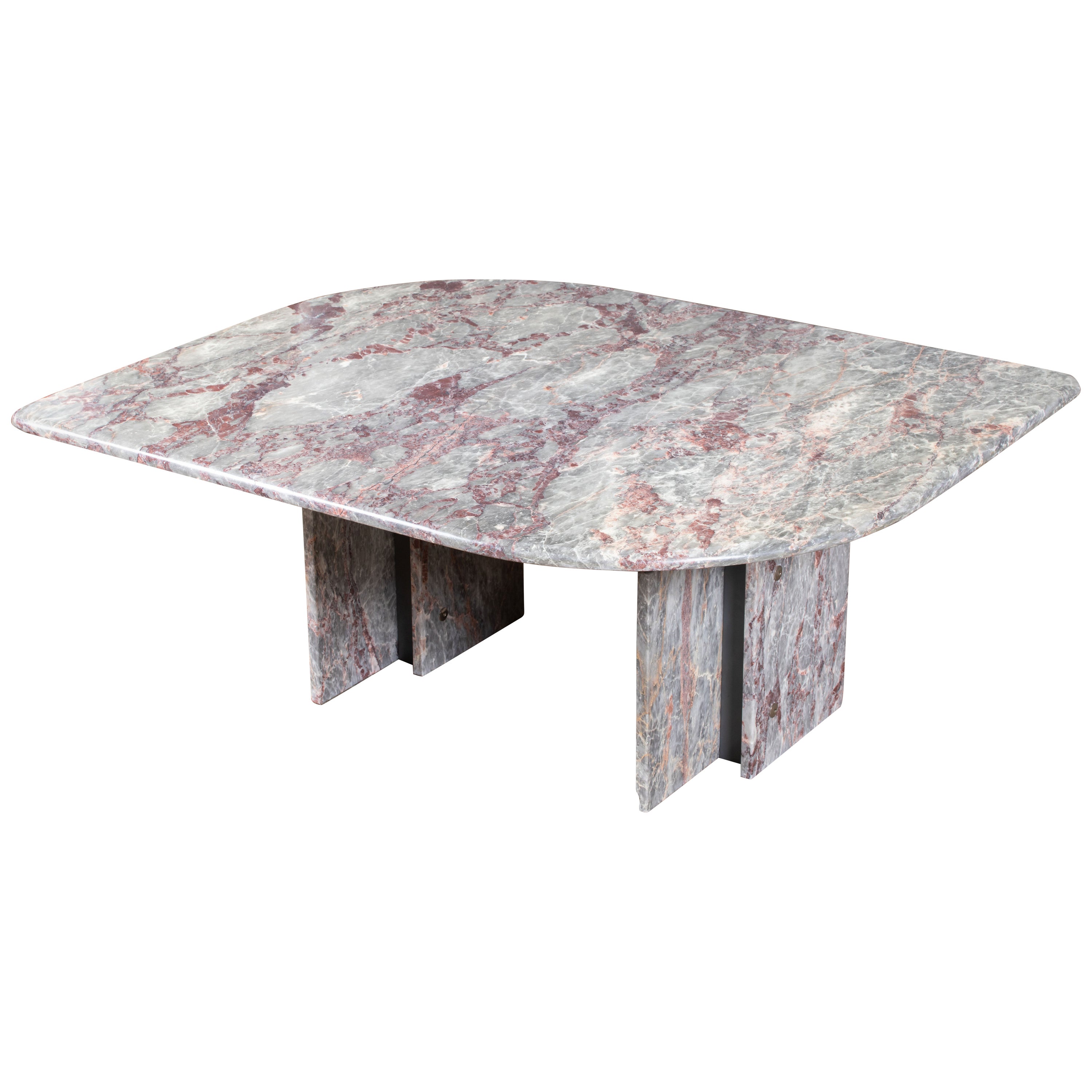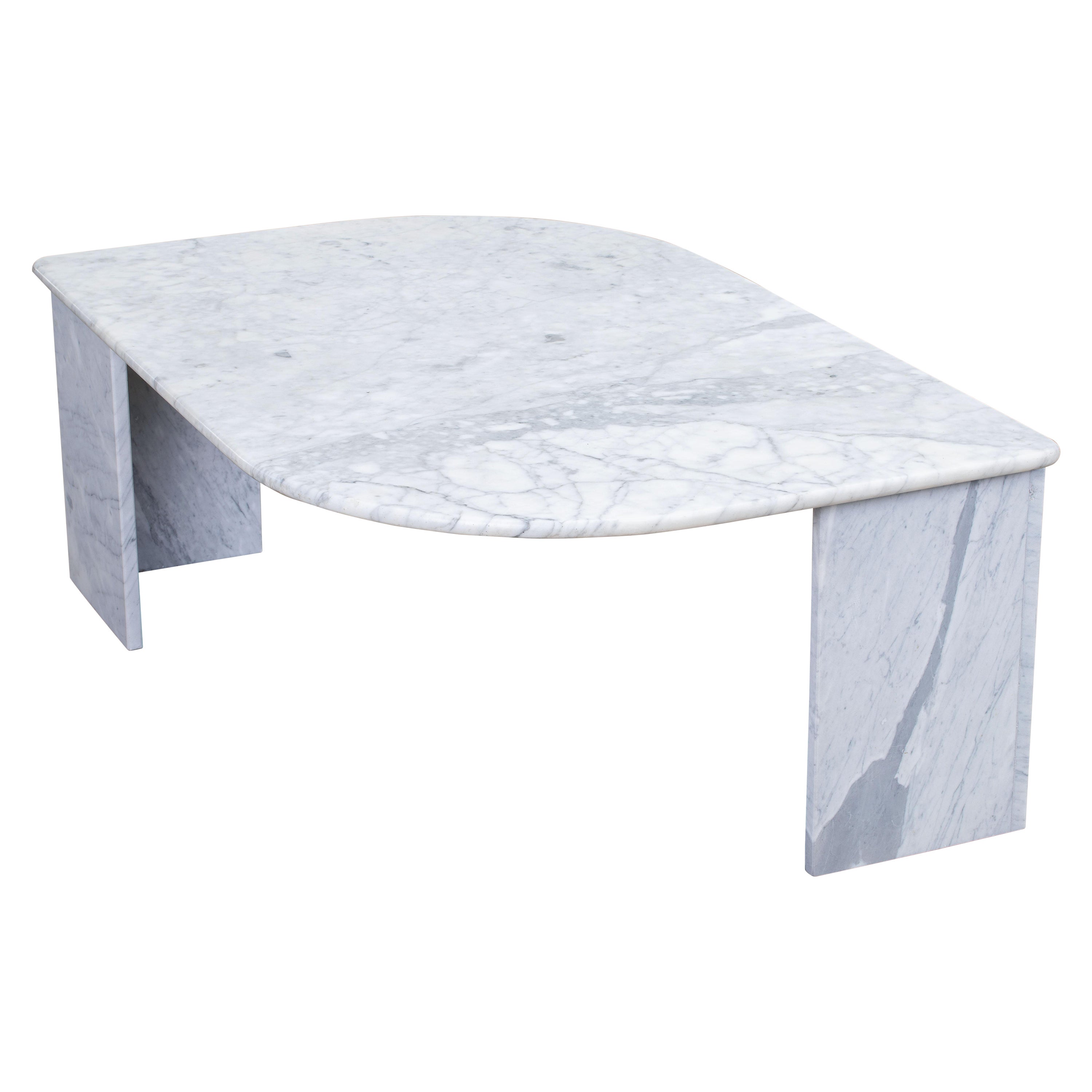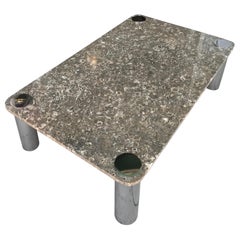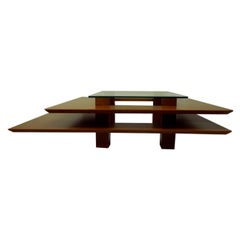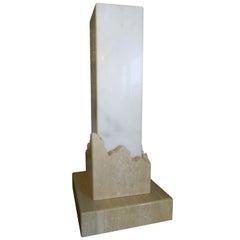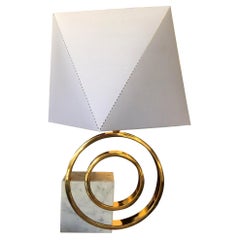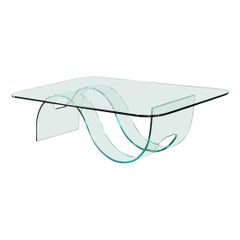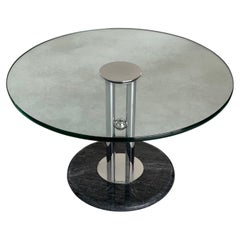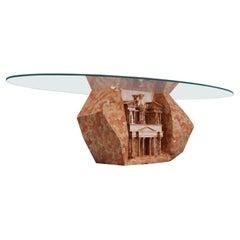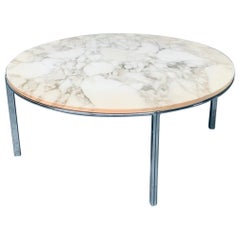Items Similar to Abbott Pattison Designed & Sculpted Italian Modern Marble & Glass Coffee Table
Want more images or videos?
Request additional images or videos from the seller
1 of 6
Abbott Pattison Designed & Sculpted Italian Modern Marble & Glass Coffee Table
About the Item
A 20th century master’s coffee table designed by renowned artist/sculptor Abbott Pattison, (1916-1999). handcut puzzle pieces of Carrara marble imported by the artist in the early 1960s from Florence, Italy, interlock to form the intricate bases in the shape of Jean Dubuffet forms. The majestic large top is handcut with a Dubuffet shape and beautiful freeform curves. Topped off with a major 3/4'' thick biomorphic glass top. A very important and priceless piece of "Furniture as Art" of the 20th century. This one of a kind original piece is from the original owner’s multimillion dollar vintage Palm Springs Art Collector's Estate.
COLLECTIONS:
Johnson Wax Company
Neuberger Collection
Leigh Block Collection
Ravinia Park, Highland Park, Illinois
Meninger Foundation
Hirschorn Collection
Nathan Cummings Collection
U.S. State Department (four sculptures)
And others, including many private collections in the U.S. and Europe, such as Buckingham Palace and the collection of the Late Duke and Duchess of Windsor; Lee A. Freeman; James Alsdorf; former Senator Charles Percy; Senator J. Rockefeller; Albert Robin; Nathaniel Saltonstall, etcetera.
PERMANENT MUSEUM COLLECTIONS:
Whitney Museum
Art Institute of Chicago
Israeli State Museum
Chrysler Museum
Portland Museum, Maine
Portland Museum, Oregon
Corcoran Museum
San Francisco Museum
California Palace of the Legion of Honor
Addison Gallery, American Art
St. Louis Museum
Neuberger Museum
Phoenix Museum
St. Paul Art Center
Evansville Museum, Indiana
Davenport Museum
Davenport Museum of Fine Arts
Palm Springs Desert Museum
Wichita Museum
Flint Institute of Arts, Michigan
Farnsworth Museum
Georgia Museum
Yorkshire Sculpture Park, Yorkshire, England
Norfolk Museum
Biography:
Internationally known as a sculptor, American artist Abbott Pattison worked primarily in cast bronze, welded brass and carved marble. Recognition of his talent first came in his hometown of Chicago through representation by the Fairweather-Hardin Gallery, but his reputation soon spread nationally, with eight one-man exhibits in New York City at The Downtown Gallery and Edith Halpern Gallery. Later he was also represented in Los Angeles by The Feingarten Gallery, and in London by The Alwin Gallery.
Pattison was born May 15, 1916, to William and Bonnie Pattison, the second of seven children. His father was a well-known real estate developer in the city. He first attended art classes at The Art Institute of Chicago at the age of 10, while a student of Francis Parker School. Later he chose to enroll at Yale University because of their art program. While there, he was thoroughly trained in classical traditions of drawing, fresco painting and the Sienese egg tempera style, eventually choosing sculpture as his primary art form.
After he graduated with a liberal arts degree in 1937, he enrolled in the master’s program at Yale. He graduated with a degree in fine arts in 1939. Among the fifty-two students who graduated from the art/architecture department that year, Pattison was awarded first prize, which was a traveling fellowship, and he chose to travel to Northern China and Japan for six months. While in China, he lived in a mountain village 150 miles from Peking with a Franciscan priest who was building a Catholic church in stone quarried from a nearby mountain, Pattison carved Twelve Stations of the Cross for the monastery with the assistance of several local stone masons. Next traveling in Japan, Abbott Pattison was arrested as a spy, but soon released. He warned his interrogators that he would return to Japan, but he would be wearing a uniform the next time.
Upon his return to The United States in 1940, Pattison went directly into Officer’s Training School. From 1942 to 1945, he was given active command as captain of a Pacific Command sub chaser, doing convoy duty between Hawaii and the Midway Islands. He was promoted to first executive officer on a destroyer escort, and was thereafter given full command as captain of a second destroyer escort, running convoys across the Pacific from Florida to the African Coast and into the Mediterranean. He won a Military Merit medal for personal bravery, and his ship received battle stars for downing several German fighter planes. Pattison noted that the only regular paycheck he ever received was from that time when he served as an officer in the United States Navy.
At the end of World War II, Pattison returned to Chicago, and to his art, so that by 1946 he was well known in art circles as the youthful recipient of both the Logan and Eisendrath awards, and as a recipient of one of the four prizes awarded nationally to sculptors by The Metropolitan Museum. He joined the faculty of The Art Institute of Chicago as an instructor of sculpture.
In 1953, Pattison was a visiting sculptor at The University of Georgia, and was asked to return the following year as a sculptor in residence with no teaching duties, having been honored for a second time with the Pauline Palmer Prize for sculpture. At the University, Pattison carved a large marble sculpture, titled Mother and Child and went on to create a 12-foot high abstract horse for the campus in welded plate steel, now called familiarly The Iron Horse. At the time, this sculpture represented the cutting-edge of avant-garde art in the United States. The sculpture was placed in front of the dormitory of the University’s football team, and angry students attacked the horse with spray paint, manure, fire and hammers, with the art department professors merely looking on. The Athens, Georgia police force was called in to quell the disturbance. This event became famous as the first official riot on an American college campus, and became the feature of a Public Broadcasting System movie special. The quarter-inch thick boiler plate steel sculpture withstood the attack and remains intact, but it was immediately removed from the campus and has never returned, sitting in a local farmer’s field since 1954.
Abbott Pattison regarded all sculptors, presently living or throughout time, as his kin. His work was inspired by classical Classical Greek and Etruscan forms, elements of which he interpreted in creating his abstract bronzes, welded braised figures, and marble carvings.
Prior to attending Yale, Pattison did more drawing and painting than sculpture. It was at Yale that he decided to work mostly in sculpture. However, he often exhibited his paintings, watercolors and terra cotta sculptures alongside his bronze sculptures at gallery shows.
Shortly before his death in 1999, Pattison advised his artist son Harry: “If an artist can manage to paint four or five great paintings in a lifetime that’s all that is necessary. It isn’t easy.”
Abbott Pattison spent his summers at his home and studio on the coast of Maine, occasionally teaching at The Skowhegan School of Painting and Sculpture, where he also served on their Board of Governors. He spent his winters in Florence, Italy where the bronze foundry that cast his works is located. The rest of his time he worked in his Chicago studio, occasionally teaching at the Art Institute of Chicago. He continued working to the day of his death at age 82.
Currently more than thirty of Pattison’s works are on public display throughout Chicago, and his sculptures are in the collections of universities, corporations and museums worldwide, including the Whitney Museum in New York City, the Art Institute of Chicago, the Corcoran Museum in Washington, D.C., the San Francisco Museum and the Museum of the Israeli State in Jerusalem. Five of his pieces are owned by the United States State Department and are located in embassies overseas. One of Abbott Pattison’s sculptures is in Buckingham Palace, London.
- Creator:Abbott Pattison (Artist)
- Dimensions:Height: 19.75 in (50.17 cm)Width: 46 in (116.84 cm)Depth: 68 in (172.72 cm)
- Style:Modern (In the Style Of)
- Materials and Techniques:
- Place of Origin:
- Period:
- Date of Manufacture:circa 1964-1965
- Condition:Wear consistent with age and use.
- Seller Location:Palm Springs, CA
- Reference Number:Seller: 524271stDibs: LU1767227347182
Abbott Pattison
Abbott Pattison was an American sculptor and abstract artist. After receiving his BFA from Yale in 1939 and a stint in the Navy, Pattison returned to his native Chicago. From the 1950s through the 1970s, he traveled to Italy to cast his one-off bronzes at the renowned Marinelli Foundry in Florence. Pattison's works are in the permanent collections of the Whitney, the Art Institute of Chicago, the Corcoran Gallery of Art and the Farnsworth Art Museum and among others.
About the Seller
5.0
Vetted Seller
These experienced sellers undergo a comprehensive evaluation by our team of in-house experts.
Established in 2012
1stDibs seller since 2015
224 sales on 1stDibs
Typical response time: <1 hour
- ShippingRetrieving quote...Ships From: Palm Springs, CA
- Return PolicyThis item cannot be returned.
Authenticity Guarantee
In the unlikely event there’s an issue with an item’s authenticity, contact us within 1 year for a full refund. DetailsMoney-Back Guarantee
If your item is not as described, is damaged in transit, or does not arrive, contact us within 7 days for a full refund. Details24-Hour Cancellation
You have a 24-hour grace period in which to reconsider your purchase, with no questions asked.Vetted Professional Sellers
Our world-class sellers must adhere to strict standards for service and quality, maintaining the integrity of our listings.Price-Match Guarantee
If you find that a seller listed the same item for a lower price elsewhere, we’ll match it.Trusted Global Delivery
Our best-in-class carrier network provides specialized shipping options worldwide, including custom delivery.More From This Seller
View AllFossilized Brown Marble and Chrome Modern Coffee Table by Pace Collection
By Pace Collection, Steve Chase
Located in Palm Springs, CA
This modern, sexy coffee table was in the living room of a Palm Springs Estate designed by the late, Steve Chase. The entire estate was done in taupe, browns, chrome and Lucite. The top is real stone and looks to be a rare Moroccan Fossil...
Category
Vintage 1980s American Modern Coffee and Cocktail Tables
Materials
Marble
Clemmer Heidsieck Three-Tier 1990s French Modern Coffee Table
By Helène Clemmer Heidsieck
Located in Palm Springs, CA
Quite a modern yet timeless statement. An architectural coffee table designed by French artist Clemmer Heidsieck. Purchased in Nice, France. Combination of beech veneer and ashwood. ...
Category
1990s French Modern Coffee and Cocktail Tables
Materials
Glass, Wood
Vintage Brutaist Italian Travertine and Marble 1970s Modern Column Lamp Signed
Located in Palm Springs, CA
One of our favorite lamps currently in our North Palm Springs showroom. A very modern Italian travertine column lamp made of brutalist style ja...
Category
Vintage 1970s Italian Modern More Lighting
Materials
Marble
$840 Sale Price
20% Off
1970s Italian Modern Lamp in Brass & Marble Custom Shade by Giovanni Banci
By Giovanni Banci
Located in Palm Springs, CA
This is very rare and beautiful Italian modern lamp was designed by Giovani Banci in the 1970s. This lamp is made of white Carrara marble and beaut...
Category
Vintage 1970s Italian Modern Table Lamps
Materials
Carrara Marble
Italian Modern Marble 1980s Pop Art/Memphis Style Sculpture by Rose Grant
By Memphis Group, Memphis Milano
Located in Palm Springs, CA
We acquired 3 sculptures from the estate of the late artist Rose Grant. This trailblazing housewife turned artist trained under the Italian masters in Florence and created a series ...
Category
Vintage 1980s Italian Post-Modern Abstract Sculptures
Materials
Carrara Marble
Vintage 80s Post Modern Original Italian Carrera Marble Sculpture by Rose Grant
By Memphis Milano, Memphis Group
Located in Palm Springs, CA
We acquired 3 sculptures from the estate of the late artist Rose Grant. This trailblazing housewife turned artist trained under the Italian masters in Florence and created a series ...
Category
Vintage 1980s Italian Post-Modern Abstract Sculptures
Materials
Carrara Marble
You May Also Like
Modern Sculpted Curved Glass Coffee Table
Located in North York, ON
Modern sculpted curved glass coffee table. Unique curved modern design all constructed and moulded from glass. American, circa 1980s, all original. ...
Category
Vintage 1980s American Modern Coffee and Cocktail Tables
Materials
Glass
$3,960 Sale Price
20% Off
Post-Modern marble & glass coffee table, Italian design, circa 1980s
Located in leucate, FR
Post-Modern designer coffee table.
Marble base, chrome structure composed of two parallel cylinders and a sphere. Circular safety glass top (thickness 2.5 cm, diameter 65 cm).
The ta...
Category
Vintage 1980s Italian Post-Modern Coffee and Cocktail Tables
Materials
Marble, Metal, Chrome
Hand Sculpted Marble Coffee Table with Glass Table-top
By Duffy London
Located in London, GB
Civilization is a series of uniquely hand-carved marble tables, based on ancient Temples and Monuments hewn from their surrounding landscapes. The series pays homage to their great a...
Category
2010s British Coffee and Cocktail Tables
Materials
Marble
$57,013 / item
Mid-Century Modern Italian Design Marble Coffee Table, 1960s, Italy
Located in Oud-Turnhout, VAN
Vintage Mid-Century Modern Italian Design Marble Coffee Table. Made in Italy, 1960s / 70s. Round marble top on chrome metal base. Very nice yellowish carrara marble top on chromed fo...
Category
Vintage 1960s Italian Mid-Century Modern Coffee and Cocktail Tables
Materials
Marble, Metal
$2,569 Sale Price
20% Off
Italian Design Marble Coffee Table, 1970
By Up&Up, Mario Bellini, Angelo Mangiarotti
Located in Kaštel Sućurac, Splitsko-dalmatinska županija
Beautiful grey, white and pink marble table.
The heavy eye-shaped top rests on two marble blocks with a metal structure between.
This table is really standing-out.
Category
Mid-20th Century Italian Hollywood Regency Coffee and Cocktail Tables
Materials
Marble
Italian Design Marble Coffee Table, 1970
Located in Kaštel Sućurac, Splitsko-dalmatinska županija
Beautiful grey and white marble table.
The heavy eye-shaped top rests on two marble V blocks.
Category
Mid-20th Century Italian Mid-Century Modern Coffee and Cocktail Tables
Materials
Marble
Recently Viewed
View AllMore Ways To Browse
Glass And Marble Coffee Table
Marble And Glass Coffee Table
Iron Coffee Table Design
Italian 3 Piece Table
At10 Coffee
Large Coffee Table In Glass Modern
Marble Glass Top Table Italian
Marble And Glass Cocktail Table
Display Glass Coffee Table
Italian Curved Glass Table
Collectors Coffee Table
Japanese Design Coffee Table
Marble Glass Top Coffee Table
Marble Glassed Marble Top Coffee Tables
Carved Italian Coffee Table
Coffee Table System
Japanese Modern Coffee Table
Glass Coffee Tables Curved
